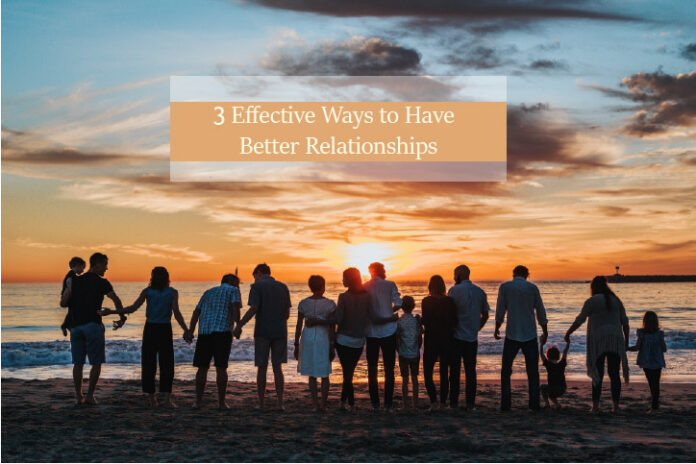
Growing up in western society, we take classes on everything from math to science to art. However, we don’t have a standard curriculum that includes the teaching of basic relationship skills. If we were lucky enough, we received solid, competent informal training via contact with parents and other adults in positions of influence. If not, we had to learn on-the-fly. For those of you who want a quick course on better relationship skills, we want to show 3 effective ways to have better relationships.
How to Have Better Relationships
Here are 3 tips:
- Build Trust
If you want to have better relationships, you are going to have to be able to get other people to trust you. To do this, you’ll need to emphasize quickly how you are different from all the rest. That means you’ll need to demonstrate integrity and honesty from the get-go. Some ways to do that include:
-
- follow up when you say you are going to follow up. Nothing hurts credibility more than being casual about others’ time and needs. If you say you are going to call, call. On-time.
- be on time. It shows respect for others. Try to understand them if they are suffering from social anxiety in relationships by thinking about the future or depression in relationships for unfruitful activities of the past.
- don’t agree with everything the other person says. Have your own opinion from time to time. People actually enjoy that, you know.
- return emails and phone calls promptly. Show others that you value and respect them.
- You can provide unique psychology gifts that work as a positive psychological stroke and to have better relationships. Also, everybody likes to receive gifts.
- Avoid gossip, especially about ex-lovers and friends. It puts you in a bad light as someone that harbors grudges and engages in pettiness.
- Listen. Really Listen.
Most people have no clue how to really listen to others. It has less to do with content (or, the subject matter of the discussion), and more to do with the process (how they are saying it, at what time, in what manner, etc). Attend to:
-
- what the person likes to emphasize. If they mention five times in the first three minutes of your conversation that they are close with their family, you can guess that family is a very important part of their life.
- body language while talking. Body language should be congruent with the content of the message being delivered. If the individual talking is happy, they tend to gesticulate, smile, and speak more quickly. If they don’t trust you, their body language will be close off (arms crossed, lack of eye contact, etc). Pay attention to what their body is telling you.
- the tone of voice and message is important also. It serves to emphasize and enhance discussion points.
- Limit Your “Relationship Rules”
We all have rules for our relationships, whether we know this or not. Usually, we have fewer rules for our best and closest friends, and more rules for our lovers and significant others. Therein lies the problem. For instance, your rules of engagement (things you expect, in other words) for your best friend might include:
-
- be loyal to me
- prioritize your time with me over others
- support me
Your rules for your significant other usually include:
-
- be with me, and only me
- don’t look at other people, or find them attractive
- don’t tell me if you do
- remember what I was wearing during significant dates (our first date, etc)
- tell me I’m beautiful (or handsome)
- don’t tell me if I’m not (beautiful or handsome)
- bring me flowers
- spend most of your time with me
- etc.
See the pattern here? It’s backward. The more important the relationship (in our mind), the more we tend to place additional rules and restrictions on it. This, in turn, puts more pressure on our significant other to follow these rules (if they even are aware of them in the first place!)
Limit your rules in all your relationships, thereby giving the relationship more room to flourish and prosper. You can learn more like this type of tips from the newhopepsychology website.





